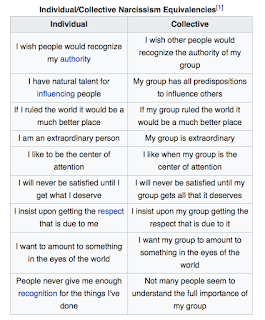NPD, Part 2

In an earlier post on Narcissistic Personality Disorder I refused to draw a link between this individual dysfunction and mass movement dysfunction because I wasn’t well enough versed on it. Since then, I’ve done a bit of research and learned a little something about Collective Narcissism. Allow me to cite this very heavily sourced Wiki passage on what it means:
An important characteristic of the leader follower-relationship are the manifestations of narcissism by both the leader and follower of a group.[18] Within this relationship there are two categories of narcissists: the mirror-hungry narcissist, and the ideal-hungry narcissist—the leader and the followers respectively.[18] The mirror-hungry personality typically seeks a continuous flow of admiration and respect from his followers. Conversely, the ideal-hungry narcissist takes comfort in the charisma and confidence of his mirror-hungry leader. The relationship is somewhat symbiotic; for while the followers provide the continuous admiration needed by the mirror-hungry leader, the leader's charisma provides the followers with the sense of security and purpose that their ideal-hungry narcissism seeks.[18] Fundamentally both the leader and the followers exhibit strong collectively narcissistic sentiments—both parties are seeking greater justification and reason to love their group as much as possible.[1][18]To simplify and underscore Wiki reproduces this chart:

We cannot keep going on about the dangers of those alienated from normal human behavior by NPD without acknowledging that such mentally unhealthy people do not operate in a vacuum. There are both victims of their all-consuming self-absorption…and enablers of it. At the time of that post five years ago when I begged off going after the avid and frightening followers of a leader afflicted with NPD, I didn’t realize how much analysis and literature existed on them. Here’s a partial list of references cited in a psychoanalytical abstract titled, Narcissistic Leaders and Their Victims: Followers Low on Self-Esteem and Low on Core Self-Evaluations Suffer Most.
Narcissism, a personality trait characterized by grandiose and overly positive self-views, is not only rising in Western individualistic countries (Twenge et al., 2008; Twenge and Foster, 2010), but also appears to be societally valued as evidenced by narcissists’ emergence as leaders (Brunell et al., 2008; Nevicka et al., 2011a; Grijalva et al., 2015a). The reason for this is that narcissistic individuals possess many characteristics that people associate with a prototypical leader (e.g., confidence, extraversion, dominance; Smith and Foti, 1998; Judge et al., 2002; Kellett et al., 2006; Paunonen et al., 2006). Furthermore, narcissists’ charm, humor, enthusiasm and often attractive charismatic vision (Galvin et al., 2010; Goncalo et al., 2010) engender positive first impressions (Back et al., 2010), which can facilitate successful appraisal in selection contexts and help narcissists rise to power.
Note the dates in those references. Like the references in the passage above about Collective Narcissism, they pre-date the current outbreak of Trumpian uber-NPD. So this is not a case of psychology trying to fit our political times, but rather an unhealthy, unwholesome, wholly undemocratic mental state now fully manifesting itself in our politics. Christopher Lasch was tracing the history and aspects of America’s creeping narcissism as far back as 1979 in his classic study, The Culture of Narcissism, where he wrote:
A number of other observers had come to similar conclusions about the direction of personality. They spoke of a collapse of “impulse controls,” the “decline of the superego,” and the growing influence of peer groups. Psychiatrists, moreover, described a shift in the pattern of symptoms displayed by their patients. The classic neuroses treated by Freud, they said, were giving way to narcissistic personality disorders. “You used to see people coming in with hand-washing compulsions, phobias, and familiar neuroses,” Sheldon Bach reported in 1976. “Now you see mostly narcissists.
If these observations were to be taken seriously, the upshot, it seemed to me, was not that American society was “sick” or that Americans were all candidates for a mental asylum but that normal people now displayed many of the same personality traits that appeared, in more extreme form, in pathological narcissism. Freud always stressed the continuity between the normal and the abnormal, and it therefore seemed reasonable, to a Freudian, to expect that clinical descriptions of narcissistic disorders would tell us something about the typical personality structure of a society dominated by large bureaucratic organizations and mass media….
In this week of mourning the passing of George H. W. Bush a great many folks from my particular political tribe have rushed forth to damn the 41stPresident at his death with the charge that he among others of his ilk (i.e. establishment Republicans) paved the way for the pathology that is Trump. Well, true that…about as true as might be blaming me for killing a butterfly back in grampa’s garden when I was a boy. We can make anything we want causal if we put our minds to it. But playing cause and effect with politics is a fool’s game…if not a scoundrel’s. One can hardly ever resist being partisan, superficial, and obtuse at the high cost of overlooking more cellular, complicated, and (what’s that word?) nuanced factors. My comrades may not like to hear it but tying the racist Willie Horton ad from the Bush campaign against Michael Dukakis in 1988 to the rise of Trump in 2016 is as simpleminded as those New York Times visits to the heartland trying to tie economic stress to Trump’s rise. It’s superficial. Not that racial and economic fears don’t help fuel the collective narcissistic view that inferior others are getting more than us at our expense. But race and economics are merely the devilish details of the dysfunction. The real determinative dynamic at play is the one going on between an id that claims it can solve all problems, knows all the best words, is stable genius, and can shoot someone on 5thAvenue and get away with it and the collective that has a scary spiritual void at the secret core of its small life that Narcissistic Personality Disorder expands and fills with resentment, anger and delusions of grandeur.
Published on December 06, 2018 09:48
No comments have been added yet.



